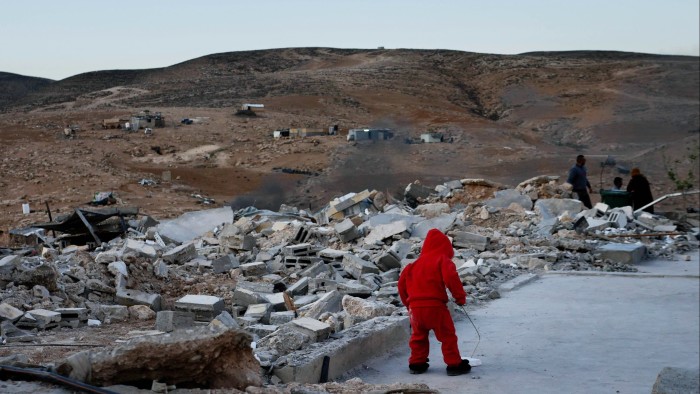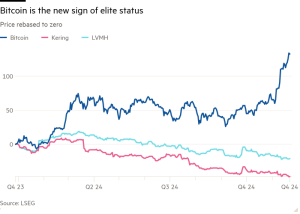How a Palestinian and an Israeli united to document West Bank demolitions

When Basel Adra and Yuval Abraham were working on their documentary No Other Land, they wondered if it would be finished too late to do any good. The farming and herding villages in the occupied West Bank where they were filming, known as Masafer Yatta, were steadily being demolished by Israeli bulldozers — homes, schools, even pigeon coops.
“A constant thought that we had is: how many villages will be left by the time we are finished? Will this expulsion already have succeeded?” Adra says over video call from the West Bank.
Made over five years by a mixed Palestinian and Israeli team, the award-winning No Other Land chronicles the efforts of villagers to resist brutal displacement by Israeli forces. At the heart of it is Adra, a Palestinian activist, as he records abuses and becomes friends with Abraham, a visiting Israeli journalist.
The film is a harrowing document of life under Israeli occupation and expulsion, but its makers had no idea what would follow. Filmed up to the Hamas attack on southern Israel of October 7 2023, in which 1,200 people were killed, the sobering film is being released at a time when two wars are being waged: the ongoing Israeli offensive against Hamas in Gaza and Hizbollah in Lebanon, with death tolls reaching more than 42,000, and the continuing battle over how the conflict is depicted.

No Other Land offers a perspective that’s at once reflective and in-the-moment, with both kinetic camerawork and quieter scenes between Adra and Abraham, who are co-directors with Hamdan Ballal and Rachel Szor. The fleet-footed Adra is shown running to document Israeli incursions, at risk of injury. The film also returns repeatedly to one family that is forced to live in a cave when Israeli forces destroy their house. (Adra stresses that the filmmakers did not seek financing from Israeli governmental institutions or NGOs.)
Abraham met Adra five years ago when he visited the West Bank to write about the demolitions. Both in their late 20s, their gradually growing friendship is a touching thread in the film.
“The trust is not something that happened between day and night. We spent some time together, we knew the work he was doing, and we worked together,” Adra says.
FT Edit
This article was featured in FT Edit, a daily selection of eight stories to inform, inspire and delight, free to read for 30 days. Explore FT Edit here ➼
Woven into the film like flashbacks are excerpts from home movies made when Adra was a child that show his activist father responding to the occupation. These sequences strike a ruminative tone as Adra reflects on them in a voiceover, but at other moments No Other Land erupts into violence.
In Masafer Yatta, we see IDF troops shoot a young man named Harun Abu Aram at close range while confiscating an electricity generator. Paralysed, he is taken by his family into a cave but, we are told, he lived only two more years. (The IDF told the AFP news agency in 2021 that a group of Palestinians had attacked soldiers who were evacuating an “illegal building” and who fired into the air in response. It also said it would investigate the incident.) Later, in a coda filmed about a week after October 7, Adra records an Israeli settler shoving and then shooting one of his cousins. (According to Adra, the settler is still free.)
Elsewhere in the film, even peaceful protests are broken up. “Basel and I participated in dozens of nonviolent protests in the West Bank, which were all immediately deemed illegal,” Abraham says, speaking from Tel Aviv on the same group call. “By the definition of the law, any protest is illegal unless the military commander authorises it, which never happens.”

Speaking to Adra and Abraham, it is hard for the reality depicted in the film not to intrude. Adra describes having to wait that very day at checkpoints ominously staffed by masked soldiers. That leads Abraham to point out the “structural systematic violence” that Israeli occupation exacts on all aspects of Palestinian life through day-to-day restrictions. (The film purposely roots its perspective in Masafer Yatta and does not interrupt the experience by following Abraham to his home.)
Looming over it all are the ongoing events in Gaza. Adra, a trained lawyer, has worked for years in documenting abuses and provides documentation to human rights organisations such as the Jerusalem-based B’Tselem (as well as aiding Palestinians who allege false charges against them). But he can’t contain his exasperation.
“This is insane. I never imagined that the world will allow something like this, and keep delivering bombs and weapons and money,” he says of the past year. “You work, you bring evidence, you write, you bring videos, you do advocacy. And the results are the opposite on the ground, where everything is moving as the Israeli policy wanted, which is to erase us from here.”
No Other Land — the title is taken from a Palestinian mother’s lament that her family has nowhere else to go — avoids zooming out to a third-person geopolitical view of the events. But it does sardonically include archive footage of former UK prime minister Tony Blair visiting Masafer Yatta while serving as special envoy of the Quartet on the Middle East in 2009. The street where he walked was reportedly spared demolition.

Abraham is scathing on the west’s involvement in the current conflict in terms of diplomacy, policy and supplying weapons to Israel. “I think the US plays the most substantial role in allowing this bloodbath and carnage. And I think for decades the Israeli government has blocked every pathway for Palestinian statehood and freedom,” he says, pointing also to US vetoes of UN Security Council resolutions regarding Israel’s policies.
Since No Other Land’s world premiere at the Berlin Film Festival in February, where it won two prizes, Adra and Abraham have taken it to numerous other showcases, most recently the New York Film Festival. That visit ended abruptly, however, when Israel began its incursion into Lebanon. Both men cut short their stay and caught flights home to be with family.
Both hope to appear in the UK for its release in early November. But it’s unsure whether the film, tipped as a likely contender for the Academy Award for Best Documentary Feature, will be acquired for US distribution. Abraham reports hearing “a lot of praise and love for the film” but to his knowledge no deal so far, for what he suspects are “political” reasons.
For his part, Adra voices sentiments that are perhaps unusual to hear from a conflict-hardened filmmaker and journalist. But amid the grisly chaos and peril, it’s understandable.
“I really wish that we didn’t need to make this movie,” he says, “and our life would be really simple.”
‘No Other Land’ is in UK cinemas from November 8
#Palestinian #Israeli #united #document #West #Bank #demolitions






